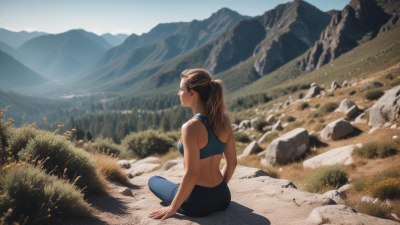How to Listen to Your Body While Traveling and Avoid Burnout
Discover essential tips for tuning into your body while traveling to prevent burnout and enhance your journey.

This image was created with the assistance of Freepik
Traveling brings excitement and adventure; however, it can also be overwhelming and lead to burnout if you're not careful. Prioritizing self-care and listening to your body is essential for enjoying your travels while maintaining your well-being. This article delves into practical strategies to help you stay in tune with your body and avoid burnout while traveling.
Understanding Burnout in Travel
Burnout is more than just fatigue; it's a state of emotional, mental, and physical exhaustion caused by prolonged stress. When traveling, numerous factors can contribute to burnout, including irregular sleep patterns, changing time zones, and the pressure to engage in various activities. Identifying these factors can help you manage your energy levels effectively.
Recognizing Physical Signs
Listening to your body means being mindful of its signals. Common signs of physical strain during travel include fatigue, headaches, irritability, and muscle tension. Pay attention to such symptoms and use them as indicators to reassess your travel pace and activities. If you start to feel overwhelmed, consider taking a break.
Establish a Routine
Establishing a routine can help your body adapt better to the travel environment. Try to maintain consistent sleep and meal times despite the changes in your location. This will help in regulating your circadian rhythm, which is vital in managing energy levels. Incorporate moments of rest and relaxation into your travel itinerary to create a balance between exploration and rejuvenation.
Hydration and Nutrition
Staying hydrated and nourished is vital when traveling. Dehydration can lead to fatigue and exacerbate feelings of stress. Always carry a water bottle with you and drink plenty of water throughout the day. Additionally, prioritize nutritious meals rich in vitamins and minerals to support your body's energy needs and recovery. Avoid excessive caffeine and alcohol, as these can affect your energy levels and sleeping patterns.
Incorporate Movement
Physical activity is essential for maintaining your energy and focus levels while traveling. Incorporate movement into your schedule through activities like walking, hiking, or stretching. Simple exercises can boost your endorphins, enhance your mood, and help alleviate tension. Remember to listen to your body and modify your activities based on your energy levels.
Practice Mindfulness
Mindfulness practices such as meditation or deep breathing can be helpful tools while traveling. They can assist in grounding you and relieve the stress of a busy travel schedule. Set aside a few minutes daily to practice mindfulness, allowing yourself to feel present in the moment. This will not only help to reduce anxiety but will also enhance your travel experience.
Prioritize Quality Sleep
Good quality sleep is crucial for recovery and mental clarity while traveling. Aim for a consistent sleep schedule and create a sleep-friendly environment by minimizing noise and light. If you're adjusting to a new time zone, consider gradual adjustments to your sleeping pattern a few days before your travel. Invest in earplugs, an eye mask, or even a portable white noise machine to enhance your sleep quality.
Set Realistic Expectations
Setting realistic expectations for your travel itinerary can help manage stress levels and prevent feelings of burnout. Avoid cramming too many activities into one day. Allow yourself the freedom to explore at your own pace and take breaks as needed. Spontaneity can enhance your travel experience, so leave room in your plans for unexpected adventures.
Connect with Nature
Nature has an incredible ability to recharge our spirits. Whenever possible, make time to connect with the outdoors during your travels. Whether it’s a leisurely hike, a walk in the park, or simply sitting by the ocean, immersing yourself in nature can promote relaxation and mental well-being. Nature provides a quiet space for reflection and rejuvenation.
Social Connections
Traveling often brings opportunities to meet new people, but it can also be draining. Stay attuned to your social energy levels and don’t hesitate to take time for yourself if needed. Engage with locals or fellow travelers when you feel energized, but also allow for moments of solitude to recharge your batteries. Balancing your interactions is key to enjoying the social aspects of travel without becoming overwhelmed.
Utilize Recovery Techniques
Incorporate recovery techniques such as stretching, foam rolling, or gentle yoga into your routine, especially after days filled with physical activity. These practices can alleviate muscle tension, improve circulation, and enhance overall relaxation. There are numerous online resources and apps available that can guide you in incorporating these techniques into your travels.
Monitor Your Mental Health
Mental health is just as important as physical health. Be conscious of your emotions and mental state while traveling. If you're experiencing feelings of anxiety, loneliness, or overwhelm, acknowledge these feelings without judgment. Consider journaling your thoughts or discussing them with a trusted travel companion. If you find yourself in need, seek professional help or rely on mental health apps available on smartphones.
Traveling is a rewarding adventure that allows us to explore new cultures, cuisines, and landscapes. However, neglecting our physical and mental well-being can lead to burnout, diminishing the joys of travel. By learning to listen to our bodies and implementing practical strategies for self-care, we can ensure that our travel experiences are both enriching and restorative. Remember, the journey is just as important as the destination; prioritize your health, and you will fully embrace every moment of your travels.











